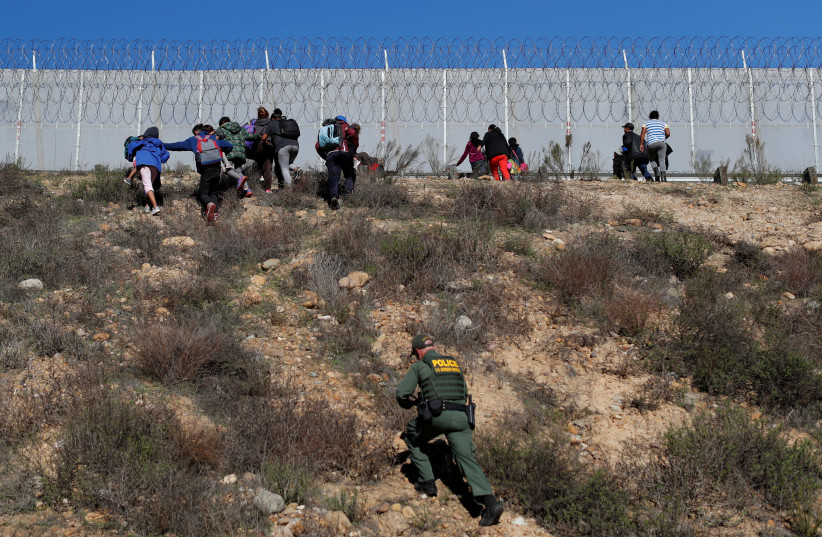Recently, the US State Department reported to Congress that it was “reasonable to assess that the weapons it has provided to Israel have been used [during the war in Gaza] in ways that are inconsistent with international human rights law (IHL).” Really?
To better understand the meaning of such statements, let’s look at some hypothetical cases.
Hypothetical cases to be paralleled with Israel's circumstances
Let’s assume that the government of Mexico has ceased to function and various gangs, led by drug cartel chieftains, have taken over the Mexican states that border the United States.
Let’s further assume that a major US adversary – China or Russia – stepped in to support these gangs with huge quantities of weapons, ammunition, military training, etc. Over the course of 20 years, these gangs have built major underground fortifications in Ciudad Juarez and Tijuana.
Then, on a certain July 4, they launched a surprise attack on the US – firing thousands of rockets on towns from Texas to California, penetrating San Diego and El Paso, killing thousands of Americans, and kidnapping hundreds of others to tunnels they have prepared in advance in Juarez and Tijuana.

Subsequently, they demand that the US release thousands of criminals – murderers, rapists, robbers, drug dealers, in return for the release of the hostages.
What options would the US have other than a military operation? Surrender to the terrorists’ demands? Unthinkable. Talk to the terrorists to convince them that they are wrong? Laughable.
Set siege to Juarez and Tijuana and refuse to let anyone go in or out until the hostages are released? Impractical. The terrorists would likely begin executing the hostages one-by-one to create pressure to lift the siege and the only ones who would really be hurt by the siege would be the innocent civilians – as the terrorists would ensure that they have plenty of food and water, leaving the rest of the population to die of starvation and thirst.
It’s not difficult to guess what the United States might do in such a scenario. It is enough to look back at what it did in places that presented much less of a threat to territory – located thousands of miles away from its borders – such as Mogadishu, Somalia (1993) and Mosul, Iraq (2016); and of course, during many World War II incidents.
The US would surely invade Mexico, use massive force to eradicate the terrorists in their hideouts, deploy its special forces to find and rescue the hostages, and so on. Hundreds of thousands of innocent Mexicans would be killed or wounded in such an operation.
War is ugly no matter how you look at it. It is much uglier when fought in urban areas.
Gaza is considered the fifth most densely populated area in the world [Hong Kong is the fourth and Gibraltar the sixth] and the terrorists have taken full advantage of thus, using civilians, mainly women and children, as human shields.
Hamas have established their headquarters in hospitals, dug holes for rocket launchers in playgrounds, and stored weapons in mosques, kindergartens, and more. There is no way to fight such evil people other than by putting “boots on the ground.”
Sending troops into such an area without supporting them with tanks, artillery guns, and airstrikes would be suicidal. No sane leadership would agree to it.
How can such a war be fought while still maintaining high ground on ethical and legal issues? Israel has taken unprecedented measures, much more than any other country that has ever fought a war and certainly more than the US has ever done, to protect civilians from being caught in the fire.
The IDF has invented the “knock on the roof” technique, using a small bomb that creates noise to warn residents to abandon buildings about to be destroyed – targeted because they serve terrorists – several minutes before it is hit by a much larger bomb, thus giving civilians ample time to escape.
Israel allows humanitarian aid to enter Gaza through convoys and areal shipments, even though it knows that much of it will be stolen by Hamas. It distributes leaflets from the air, calling on civilians to leave dangerous neighborhoods long before they are attacked, and it has helped humanitarian aid organizations build a tent city on the beach to serve as a safe haven for displaced civilians.
Let’s hope that Mexico will always remain a strong sovereign country, friendly to the US and that the purely hypothetical scenario described above will never happen.
Let’s also hope that those who keep on criticizing Israel for supposedly violating the IHL will gather the courage to look in the mirror, ask themselves how they would have reacted in similar circumstances, and realize that nobody could have done it better than Israel.
The writer is a professor and former executive vice president of the Technion – Israel Institute of Technology. An expert in management science, he is on the boards of several Israeli companies and nonprofit organizations.
